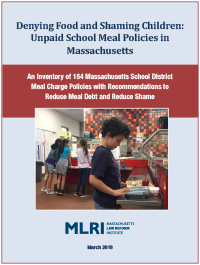

Denying Food and Shaming Children: Unpaid School Meal Policies in Massachusetts
This report by MLRI finds that the policies of many Massachusetts school districts towards families with unpaid school meal debt can be punitive towards children in low income households. MLRI conducted an inventory of 154 Massachusetts public school districts over a six month period that do not provide universal free school meals.
The study also looks at what other states are doing to address the problem of unpaid meal debt without punishing children already dealing with the burdens of poverty. In January 2018, New York Governor Andrew Cuomo proposed legislation that would require all school districts participating in the NSLP to develop a plan to ensure that a student whose family has unpaid school meal fees is not shamed or treated differently than his or her peers. In 2017, California, New Mexico and Oregon signed laws to either prevent shaming or provide meals to low income children. And West Virginia’s Board of Education voted on a state-wide policy to address school meal shaming in 2017 that was implemented at the beginning of 2018.
“No one, not an educator, cafeteria worker or administrator should ever be put in the position of refusing a student a filling and healthy meal. Nor should any student be made to be embarrassed by her family’s inability to afford a meal,” said Barbara Madeloni, President of the Massachusetts Teachers Association. “The answer to these issues lies in robust school funding that includes meals and political action to end the profound economic injustice in our communities.”
